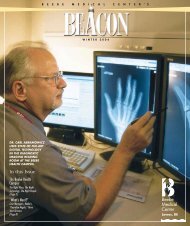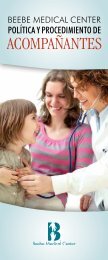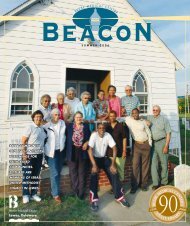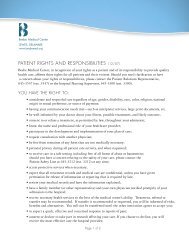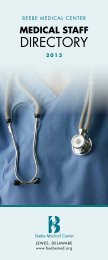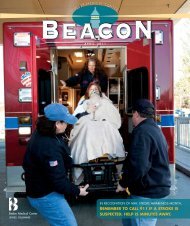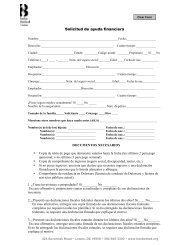BEACON â January 2011 - Beebe Medical Center
BEACON â January 2011 - Beebe Medical Center
BEACON â January 2011 - Beebe Medical Center
- No tags were found...
You also want an ePaper? Increase the reach of your titles
YUMPU automatically turns print PDFs into web optimized ePapers that Google loves.
Excellent People.Excellent Hospital.<strong>Beebe</strong> <strong>Medical</strong> <strong>Center</strong>receives the<strong>2011</strong> HealthGradesDistinguishedHospital Awardfor Clinical Excellence ®<strong>Beebe</strong> <strong>Medical</strong> <strong>Center</strong> with great pride announces that it has received the<strong>2011</strong> HealthGrades ® Distinguished Hospital Award for Clinical Excellence.The award means that <strong>Beebe</strong> <strong>Medical</strong> <strong>Center</strong> is among the top five percent ofall hospitals in the nation for overall quality. The award was designed to identifyhospitals with the lowest mortality and complications rate across a range of proceduresand diagnoses. This reflects <strong>Beebe</strong> <strong>Medical</strong> <strong>Center</strong>’s measurable recordof successfully treating its patients and sending them home with fewer complicationsthan 95 percent of all the hospitals in the nation. This is the second year ina row that <strong>Beebe</strong> <strong>Medical</strong> <strong>Center</strong> has received the Distinguished Hospital Awardfor Clinical Excellence, reflecting our commitment to quality patient care.HealthGrades, the nation’s leading healthcare rating organization, also hasgiven <strong>Beebe</strong> <strong>Medical</strong> <strong>Center</strong> 5-Star ratings, the highest attainable, for Treatmentof Heart Attack, Treatment of Heart Failure, Treatment of Coronary InterventionalProcedures, Treatment of Pneumonia and Chronic Obstructive PulmonaryDisease, Treatment of Stroke, and Treatment of Sepsis, a life-threatening bloodinfection.These ratings, announced in <strong>January</strong> <strong>2011</strong>, are in addition to the HeathGradesrankings announced in October 2010 that named <strong>Beebe</strong> <strong>Medical</strong> <strong>Center</strong> No. 1 inDelaware for Overall Orthopaedics, Best on the Delmarva Peninsula for OverallOrthopaedics, and No. 1 in Delaware for Coronary Interventional Procedures.two years in a row!2
and beds. We have to make sure that we don’t allow germsto spread. I have all the supplies I need on my cart to get myjob done.”Dawn Roach, RN, a Georgetown resident, is the chargenurse in the Operating Room Department. Dawn keeps theeight operating rooms running smoothly—scheduling roomsand cases, and making sure equipment and resources are readyand available. “Quality means providing the best patient carepossible, always keeping in mind patient safety. What allows<strong>Beebe</strong> to attain the high quality standard is our focus on teamworkand process improvement.”Milford resident Kathy Hundley, RN, works in the OpenheartUnit on the 2nd floor, where patients go to recuperateafter heart surgery. “It is very rewarding working in the unit. Asa nurse caring for the patient, we are the eyes and ears for all ofthe disciplines. We are the glue and are able to know right awaywhat the patient needs. We feel complete when we see thepatient improving.”Mary Couette, the Tunnell Cancer <strong>Center</strong> receptionist, andGeorgetown resident, is usually the first person that patientsmeet when they arrive. She sets the tone and supports the<strong>Center</strong>’s sense of team. “I try to make people feel comfortableand at ease. I watch to see if the patients need something and Imake sure they don’t have to sit too long. I like to use humorto make people more comfortable if the situation allows.”Wilson C. Choy, MD, an orthopaedic surgeon who lives inRehoboth Beach, says, “We have established a strong teamapproach and a meticulously orchestrated program. In 2010,we performed more than 800 primary joint replacements. Thiscan only have been accomplished if all team members do theirjobs, from patient education in the beginning to care on thefloors and follow-up once the patients are home.” n<strong>Beebe</strong> <strong>Medical</strong> <strong>Center</strong> has achieved several awards forexcellence in healthcare. For a list of our achievementsvisit our website, www.beebemed.org.“We haveestablished astrong teamapproach and ameticulouslyorchestratedprogram.”—Wilson C. Choy, MD“What allows<strong>Beebe</strong> to attainthe high qualitystandard is ourfocus on teamworkand processimprovement.”—Dawn Roach, RN “We feel completewhen we see thepatient improving.”—Kathy Hundley, RN“I try to makepeople feelcomfortableand at ease.”—Mary Couette,receptionist5
says several of the cardiologists refer patients to<strong>Beebe</strong> Home Health because of this monitoringprogram.It offers tremendous advantages, he says.“It keeps the patients alerted to what is going on.It heightens their awareness and drives home themessage that we as physicians want them to monitortheir body weight and watch for symptoms of heartfailure.”This program also is part of a larger heart failuretreatment-and-education program at <strong>Beebe</strong> <strong>Medical</strong><strong>Center</strong> that starts in the hospital when a patient isdiagnosed and treated and then extends into thepatient’s home. The program is so successful atkeeping patients out of the hospital—that is, loweringthe readmission rate of patients with heart failure—thatHealthGrades ® gave <strong>Beebe</strong> <strong>Medical</strong> <strong>Center</strong>a 5-Star rating for Treatment of Heart Failure in <strong>2011</strong>.“Early intervention is the key,” says Janet Davis,RN, Nurse Manager with <strong>Beebe</strong> Home Health.“The focus is on patient education, monitoringand reporting of symptoms, managing medications,and ensuring follow-up with the physician.”For Mrs. Brittingham, as with many patients, thestory started when she went to her physician becauseshe was feeling unwell. He realized immediately thatshe was suffering from dehydration and heart failureand had her admitted into <strong>Beebe</strong> <strong>Medical</strong> <strong>Center</strong>.From there the heart failure multidisciplinary team,with its high-quality treatment-and-education program,took over.“Our goal is to get their condition under controland to teach them how to take care of themselves sothat they can have a better quality of life and so thatthey don’t have to return to the hospital,” says LynnToth, RN, MSN, NP, cardiovascular medical specialistand member of the heart failure team.A patient with heart failure probably has anenlarged heart and congested blood vessels. He orshe may be retaining so much fluid that the extremitiesare swollen and the lungs have filled with fluidso that breathing is difficult. A patient can be inkidney failure. Sometimes pneumoniais developing.As the nurses, physicians, andothers are working to treat andimprove the patient’s condition,they also facilitate an educationprogram to teach the patientwhat is happening to the bodyand how the patient can play apart in controlling the disease.“We want to make sure thatthey understand their illness and what they need todo,” says Dave Brant, RN, BSN, a member of <strong>Beebe</strong>’sClinical Practice Committee and a patient educator.Patients are given an information packet aboutthe medications that may be prescribed, an overviewabout heart failure, nutritional information so theycan change their eating habits, and even a dailyweight calendar so they can monitor their weight,which reflects whether or not there is a dangerousincrease in the retention of fluid in the body. Nursestalk to them to make sure that they understand theinformation.The <strong>Beebe</strong> <strong>Medical</strong> <strong>Center</strong> team of nurses andcase managers makes sure that the patients arereferred for ongoing monitoring and support oncedischarged, whether they use <strong>Beebe</strong> Home Health,another home health agency, or a residential facility.Janet Davis says that <strong>Beebe</strong> Home Health makessure the patient’s medications are in order, schedulesappointments and any necessary transportation,and continues to monitor the patient.“It’s a fantastic program,” Mrs. Brittingham says.“I’m a lucky person.”Please call 302-854-5210 for more information. nHeart Failure Symptoms and TreatmentIn the <strong>Beebe</strong> Home Health office,Janet Davis, RN, Nurse Manager,reviews in real time patient clinicalinformation that is transmittedthrough a patient’s telemonitoringsetup. She is able to review VirginiaBrittingham’s weight, blood pressure,oxygen levels, and heart rate.Ms. Davis or another <strong>Beebe</strong> HomeHealth nurse will follow up with aphone call or a visit to the patientat home if a patient needs help.Heart failure is a condition in which the heart does not pump enough blood to meet theneeds of the body. It is chronic with no cure. However, with the right medical treatment andactive attention to lifestyle, a patient can still live a full and enjoyable life.SymptomsShortness of breath • Fatigue • Swelling of extremities • A sudden weight gainTreatmentConsult with your personal physician and a cardiologist. Treatment includes several medications,daily monitoring of symptoms, and adherence to prescribed diet and exercise.7
Patricia Houston, RN, is <strong>Beebe</strong> <strong>Medical</strong> <strong>Center</strong>’s BariatricProgram Coordinator.The goal is to help people loseweight, maintain their weight loss, andimprove their health. The two surgicalprocedures offered are adjustable gastricbanding and gastric bypass. Bothprocedures are done laparoscopically.Gastric banding patients go home thesame day of surgery. Gastric bypass patients require a brief hospital stay.“These surgical procedures assist the patient in losing weight,” Dr. Sofronskiexplains. “The patient must cultivate a new and healthier lifestyle.”Dr. McCullough agrees, pointing out that patients have to make a commitmentto change and that they cannot look at either procedure as a quick fix.Patients also should consider both the risks and the benefits of these or any othersurgical procedures and discuss them with the surgeon.The program requires patients to participate in a nutrition education programand work with a personal trainer at the gym to help them individualize theirexercise goals. Support groups are offered twice a month at the <strong>Beebe</strong> HealthCampus. Long-term follow-up with the surgeon and supportive staff membersis designed to help patients maintain their weight loss throughout their lifetime.“This is a wonderful program for patients to assist with weight-loss effortswhen traditional diet and exercise programs alone have been unsuccessful,”says Patricia Houston, who is not only the program coordinator but also a gastricband patient.For Dr. Sofronski, it is the realization of a goal that emerged when he andhis wife Emily Sofronski had their daughter Camryn. As Mrs. Sofronski was workinghard to get back into shape after her pregnancy, they both decided that notonly would they focus on their own healthy lifestyle but would like to helpothers as well.“It was an empoweringexperience for both of us,”he says. “We felt better andwe had increased energy levels.It was the genesis of startinga bariatric practice thathad a lifestyle component.”For more informationon the <strong>Beebe</strong> <strong>Medical</strong> <strong>Center</strong>Bariatric Surgical program,please call Patricia Houstonat 302-645-3100 x5410. nGastric BandingA laparoscopic surgical procedure where the surgeonfastens a band around the upper stomach to create apouch. Patients feel full after eating a lesser amountof food than in the past. Generally, the patient goeshome the same day.BenefitWeight loss, which has been proven to improve manymedical conditionsRisks include• Injury to stomach, intestines, or other organsduring surgery• Slippage of the band• Scarring and eventual bowel obstruction• Gastritis, heartburn, or stomach ulcers; gallstones• Poor nutrition• Vomiting from eating more than your stomachpouch can holdGastric bypass surgeryA surgical procedure that makes the stomach smaller,causing the body to absorb less food. The surgeonstaples the stomach in two. A part of the small intestinecalled the “jejunum” will be connected to the top partof the stomach (the pouch), thus “bypassing” the lowerpart of the stomach and the first part of the intestine.The patient has a brief hospital stay.BenefitLosing weight has been proven to improve manymedical conditions. This surgery is considered anoption when other efforts have failed and the medicalneed for weight loss is great.Risks include• Breakdown of the pouch, which would requireanother surgery• Anemia from low iron or vitamin B12 levels• Low calcium levels• Gallstones• Gastritis, heartburn, or stomach ulcers• Poor nutritionSource: U.S. National Institutes of HealthDaniel McCullough, MD, holds the adjustablegastric band that he places around thestomach, molding it to a reduced size.11
For Our CommunityWe’re looking out for yourHeart HealthA stroke is a medical Emergency.Know the signs . . .Do not ignore the warning signs.They appear suddenly.• Feeling numb or weak on one side of thebody or the face• Unclear speech; having trouble repeatinga simple sentence• Difficulty walking; feeling dizzy or falling• Losing sight in one or both eyes• Bad headacheAct quickly and call 911. Every second counts!Join BEEBE MEDICAL CENTER FOR ITS7th annualThursday, February 17, <strong>2011</strong>10 a.m. – 2 p. m.Rehoboth Beach Convention <strong>Center</strong>Registration is NOT required for this free event.IF YOU HAVE QUESTIONS, Please call 645-3468.FREE activities, food, and screenings♥ Blood pressure checks ♥ Glucose screenings♥ Cholesterol screenings at multiple stations♥ Giveaways ♥ Health displaysOur Mission<strong>Beebe</strong> <strong>Medical</strong> <strong>Center</strong>’s charitable mission is to encourage healthy living, prevent illness,and restore optimal health with the people residing, working, or visiting the communities we serve.Our Vision<strong>Beebe</strong> <strong>Medical</strong> <strong>Center</strong> will be a community-based healthcare system committed to providinghigh-quality, cost-effective healthcare in fulfillment of our charitable mission.The Joint Commission has certified<strong>Beebe</strong> <strong>Medical</strong> <strong>Center</strong> as anAdvanced Primary Stroke <strong>Center</strong>.STROKE SUPPORT GROUPFourth Thursday of Each Month at 5 p.m.A stroke support group meets at Tunnell Cancer <strong>Center</strong>,18947 John J. Williams Highway in Rehoboth Beach. Thegroup provides support to stroke survivors, care partners,spouses, and friends. It provides education and resourcesto maximize participation in home and community. Theinstructor is Holly Sullivan, Speech/Language Pathologistat <strong>Beebe</strong> <strong>Medical</strong> <strong>Center</strong>. For additional information, call302-645-3100 ext. 2436.Mended Hearts Support GroupThird Tuesday of Each Month at 2 p.m.A support group for those who have had open-heartsurgery meets at the McCurry Conference <strong>Center</strong> in the<strong>Medical</strong> Arts Building, next to the Tunnell Cancer <strong>Center</strong>on Route 24. Call 302-645-3514 for details.Find the linkon our website,www.<strong>Beebe</strong>med.org.The Beacon is published by <strong>Beebe</strong> <strong>Medical</strong> <strong>Center</strong> to present health informationto the people of Sussex County. Health information provided in theBeacon should not be substituted for medical advice offered by a physician.Please consult your physician on medical concerns and questions.Jeffrey M. Fried, President and CEO, jfried@bbmc.orgSusan L. Towers, Editor, stowers@bbmc.orgWith photography by Kevin FlemingLewes, Delaware • 302-645-3300 • www.beebemed.org


